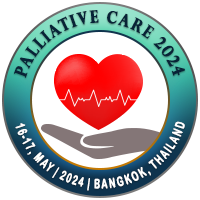
Dr. Margaret I Fitch
University of Toronto, CanadaTitle: Advanced care planning: Holding conversations ‘early’
Abstract
Introduction: Living with chronic and life-threatening conditions means living with physical, emotional, and practical challenges. Dealing with these challenges can bring about psychosocial distress and difficulty with decision-making for an individual as well as family members. Advanced care planning can contribute to reducing the distress and the uncertainty in decision-making as the end-of-life approaches. However, these can be difficult conversations to hold for patients, family members, and for health care professionals.
Methods: A rapid review of recent literature provided a current perspective regarding the process of having advanced care planning conversations, current practice and barriers to holding the conversations, as well as strategies for holding successful conversations.
Results: There is widespread agreement that advanced care planning is beneficial for individuals whether they have a chronic or life-threatening condition or not. The process is seen as best held prior to the diagnosis of a disease as well as at regular intervals throughout the course of an illness. Despite the agreement about the benefit of holding conversations about planning for end-of-life care, the practice remains infrequent and is influenced by patients, healthcare professionals, institutional, and health system barriers. A primary barrier is the lack of education about palliative care on the part of the public and of health care professionals. A primary facilitator is having clearly stated indicators for early palliative care referral.
Conclusions: Holding conversations about advanced care planning can be difficult but resources have been developed to support patients, families and health care professionals in holding these conversations and making the necessary decisions about a person’s care at end of life.
Biography
Margaret I Fitch, RN, PhD, is a professor (adjunct) at the Bloomberg Faculty of Nursing, University of Toronto. She is also the editor-in-chief for the Canadian Oncology Nursing Journal and works as an independent consultant for research and program evaluation initiatives. She has served in a clinical, educational, and administration roles within comprehensive cancer centers/networks and has maintained a strong program of research in supportive care in cancer throughout her career of more than 30 years. She has expertise in qualitative and quantitative research and a specific interest in profiling patient and family voices regarding their experience with cancer care.

